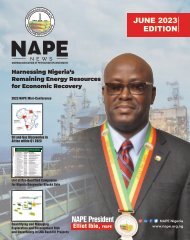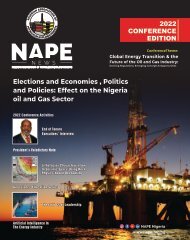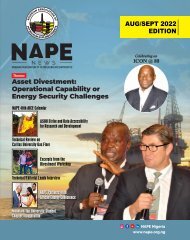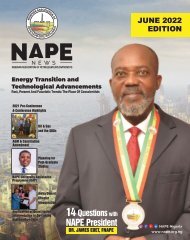NAPENews Magazine August 2021 Edition
NAPE News Magazine August 2021 Edition of the NAPE News is here for your reading pleasure. Happy reading.
NAPE News Magazine August 2021 Edition of the NAPE News is here for your reading pleasure. Happy reading.
Create successful ePaper yourself
Turn your PDF publications into a flip-book with our unique Google optimized e-Paper software.
COMMUNIQUE
Of the Pre-conference Workshop of the Nigerian Association of Petroleum Explorationists (NAPE) on
“Levers for Optimal Cost Reduction in Nigeria's Oil & Gas Production: Positioning for the New Normal”
held virtually via Zoom Link with the coordinating centre at the Eko Hotel and Suites, Lagos on MondayNovember16th, 2020
th
The Nigerian Association of Petroleum Explorationists (NAPE) on the 16 of November 2020,
with the coordinating centre at the Eko Hotel and Suites, Lagos, and being held virtually via
Zoom Link as a result of the Covid-19 Pandemic, held a Pre-conferenceWorkshop with the
theme“Levers for Optimal Cost Reduction in Nigeria's Oil & Gas Production: Positioning for
the New Normal”.In attendance were senior technical professionals and captains of industry
in the upstream oil and gas sector.
The major objective of the workshop was:
1. To package industry expertise and informed perspectives for influencing oil and
gas-related policy making and execution.
The keynote paper was delivered by Mr. Roger Thompson Brown, The Chief Executive Officer
of Seplat Plc, whose topic highlighted Resilience and Strength within the context of the
workshop theme. Other presented papers were as follows:
1. Structuring the Petroleum Industry Bills(s) for Long Term Oil and Gas Industry
Competitiveness in Nigeria, by Mr Pedro Omontuemhen, - Country Operations
Partner, Price Water House Coopers.
2. Inland Basins Exploration: Opportunities for Cost Management by Engr Abdullahi
Bomai – GGM Frontier Exploration (MMPC).
3. Feasibility of $10 per barrel Unit Crude Oil Production Cost in Brownfields by Engr
Bala Wunti – GGM NAPIMS (NNPC).
4. Improving Cost Efficiency through Joint Industry Operations and Shared Services
by Mr Chikezie Nwosu –MD/CEO Waltersmith Petroman Oil Limited.
5. Local Content Participation in the Nigerian Upstream: Lowering Barrier to Entry
by Mrs Olajumoke Ajayi, MD Asharami Energy, subsidiary of Sahara Energy.
The panel discussion was moderated by Mr. Lateef Amodu of Chevron Nigeria. The other
panelists were Mrs Ifeoma Okeke – Gas Commercialization Economist, NAPIMS; Mr Prince
Abangwu – Division Manager, Digital and Integration Schlumberger; Mr Seye Fadahunsi
(fNAPE) – ex Non-Executive Director, Pillar Oil and Mr Oge Peter–Head of Commercial,
Savannah Energy.
The speakers stressed the importance of the hydrocarbon extractive industry to the Nigerian
economy, generating over 60% of internal revenue, 90% of the foreign exchange receipts and
about 10% of the overall GDP. The current realities of the industry are the drop in oil price,
lowered demand and its depressing effect on production levels and quotas, and a resultant
fall in CAPEX. There has also been an increased debt burden for oil-dependent economies
such as Nigeria's. The long-term outlook for oil price hovers around $50-55 dollars per barrel
in 2028-29, a far cry from the over $100 level seen in 2009-14.It was also noted that the
position that oil companies occupied on the global stage is rapidly being overtaken by more
high-technology companies such as Tesla and Apple, which have overtaken the oil companies
on various stock exchanges around the world. This in turn has made the risk associated with
investing in these companies higher, and the returns conversely lower. The effect on the
investment climate in Nigeria is also a part of this macro-environmental issues. The
government has therefore made it a priority to reduce costs in order to make Nigeria a more
attractive investment destination, with a mandate for $10/barrel for operating cost. NAPE
has chosen the pre-conference conference workshop theme this year in accordance with this
objective.
The following is the communiqué arising from all the presentations and discussions at the
workshop:
Key challenges identified:
1. The average production cost in Nigeria is among the highest in the world, with various
th
estimates placing the country in at least the 70 percentile for high overall production
costs. There is also a significant tax burden associated with operating in Nigeria.
2. The many years since the PIB was first mooted in 2000 and the various iterations it has
undergone without being passed have impacted negatively on investor confidence in
Nigeria. It should be noted that even at the height of the oil price boom from 2008-2014,
CAPEX investment in the sector actually fell due to the uncertainty of the passage of the
bill. The current slide since the price crash of 2015 has seen investment drop almost 18%
year on year to date. As a result, over $30 billion of projects are still awaiting FID.
3. The break-even price and payback time for projects in Nigeria for new projects is one of
the highest in the world. There is a capital cost premium ranging from 35-100% for
project costs in Nigeria.
4. The time to realize projects is very long partly due to the long contracting cycles and
approval processes most companies have to undergo.These are further elongated by
increased travelling costs that comes with inspection of facilities and operations of
contractor companies outside of Nigeria.
5. A significant portion of the operating costsin Nigeria are composed of human, crude
handling and logistics, which are a direct response to the various challenges thrown up
by operating in the physical environment of Nigeria. Examples of these challenges are
the need for increased security due to kidnapping and the vandalization of crude
pipelines, ageing infrastructure due to low level of investment, and the low level of
standardization across the industry since most of the companies started with a go-italone
approach in the earlier days of their production history.
6. There is also significant cost increase of costs due to oversight overlapping and
duplication of regulatory functions and tariffs.
7. The reduced pace of exploration will also have a long-term effect on cost, as the effect of
resource depletion and its impact on the reserve replacement ratio will eventually
outweigh the effects of technological advancements during the production stage.
8. The impact of Local Content participation, as envisioned in the Local Content
Development Act, is yet to be realized to its full extent, due to a dearth of an
infrastructural base to support it, e.g. the lack of a local iron and steel industry, which is
vital to indigenous participation in projects development.
9. Furthermore, indigenous companies are highly leveraged, being responsible for about
90% of the $8 billion debts owed by oil companies in the country. These companies also
pay a higher cost for their debt due to the risk premium associated with them. This effect
is very visible in the marginal field sphere, where only 9 out of 30 fields awarded in 2001
had been brought on production by 2016.
Recommendations
1. Various companies along with the NNPC, who is a partner to a lot of them have embarked
on contract renegotiation as part of cost cutting and project delivery measures.
2. Strategic partnerships, seeking collaborations and sharing facilities where possible, are
on the increase and should be encouraged further. These can be in the form of increased
utilization of equipment and infrastructure - vessel, helicopter or rig sharing, supply base
coordination.
3. Reduce overhead through coordination and consolidation of resources and equipment.
4. Standardization of specifications and routines for low complexity solutions, which are
about 40% of the overall challenges
5. A shortening of the contract approval cycle which is a major factor in the high cost of
production. Lead time for purchase of equipment can be reduced through inventory
sharing and bundling of volumes to enable a better local presence for the companies
6. Harness technology to unlock cost savings, production optimization, operational
efficiency and regulatory approvals.
7. Focus a lot of investment on gas, which is not necessarily following the same cycle as oil
prices and can act as a hedge. To that effect, the government will also need to incentivise
investment in the sector through the new measures in the PIB.
8. Optimize of General and Administration costs.
9. Continually add to known reserves through a deliberate exploration program in the
inland basins, as a lot of the easy oil in the Niger Delta region are already discovered. An
example is recent discoveries in the Benue Trough which included relatively shallow HC
bearing units.
10. Use relatively less expensive, high impact technology and analogues to target and
develop these resources.
11. Setting up of an energy bank which can provide low cost loans to companies in this space.
12. Revive basal companies such as Ajaokuta Steel, which will provide the necessary impetus
for the building of the necessary utility infrastructure. Also encourage local companies to
train their staff to efficiently deliver projects with reduced foreign component.










